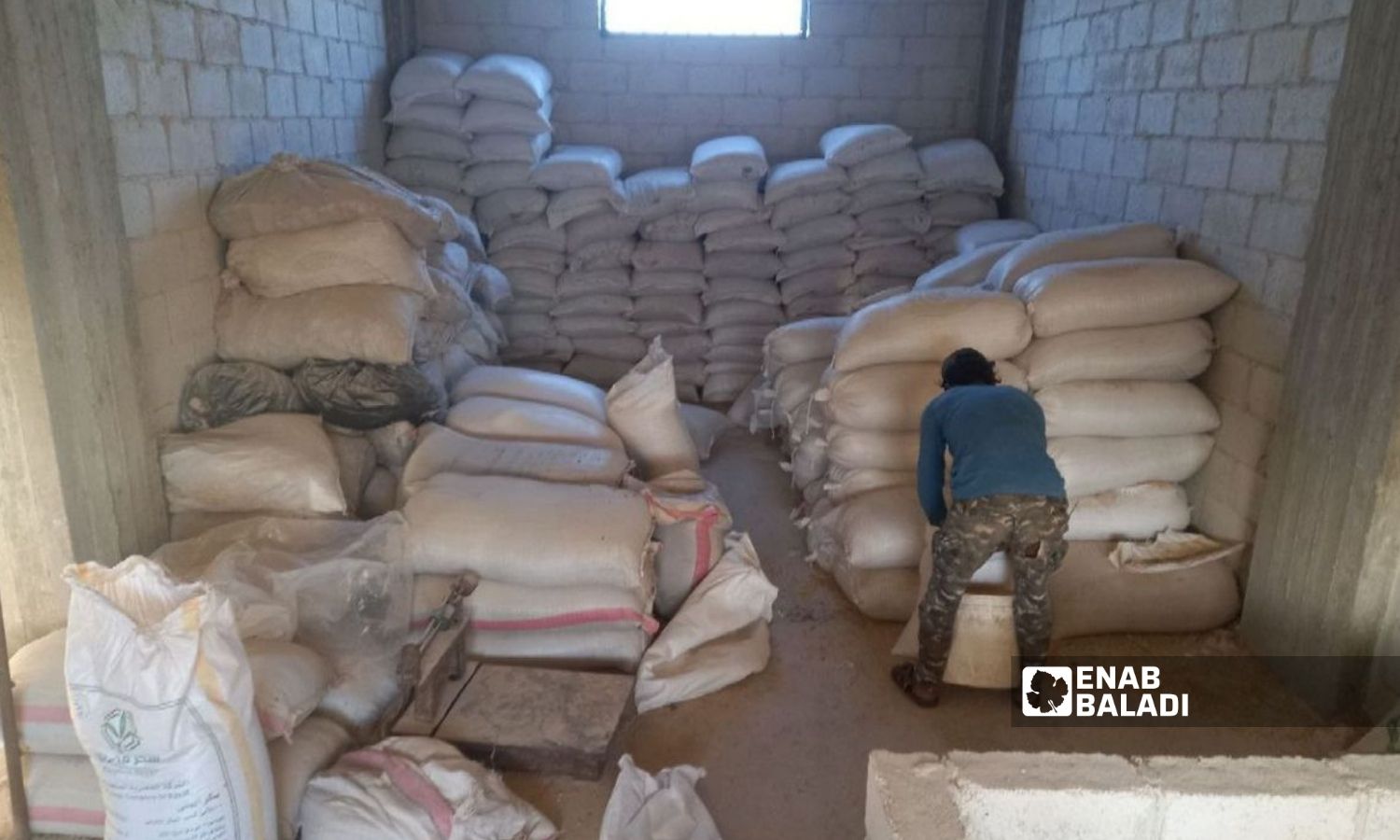



Enab Baladi – Halim Muhammad
The 33-year-old Youssef is no longer interested in the calls of the Peasant Association regarding the registration of government-subsidized livestock feed in the southern Daraa governorate after its price became no different from its prices in the local market which some dub as the free or black market.
In front of a feed grinder in the western countryside of Daraa, Youssef chooses the ingredients of the fodder mixture that he prepares to feed his cows.
He told Enab Baladi that with the convergence of the prices of free market feed with subsidized feed, he resorted to buying at the free price to ensure the quality of the fodder mixture and not wait until the Peasant Association brought in fodder.
Youssef, who owns three cows, added that he desires to receive the feed at a subsidized price, which reduces the production costs, but the work of the associations is governed by the routine of state departments, and the joints of their work are controlled by influential people, considering that they have become “useless” after the decline in their role in supporting the farmer and the breeder.
Abdul-Rahman, 55, of Tal Shihab town in the western countryside of Daraa, said that the association only distributed two batches of fodder during the last summer.
“Basically, the quantities of subsidized fodder are not considered an alternative because the delay in its arrival and its prices make the breeder rely on the black market,” according to Abdul-Rahman.
On the reasons for the rise in the prices of subsidized fodder, Khaled, a former member of one of the agricultural associations in Daraa governorate, explained that the fees for transporting fodder are the main reason for raising its prices and that the General Foundation for Feed delivers the allocations in the city of Izraa, forcing the farming associations to pay the transport fees, which increase the further the area is from Izraa.
Khaled added to Enab Baladi that the transport fare from Izraa to the villages of the Yarmouk Basin, for example, is no less than 500,000 SYP, which prompts the association’s management to raise the subsidized price to cover transportation expenses.
The former member of the Peasant Association considered that this caused the livestock breeders to refrain from registering and waiting for their allocations of subsidized fodder to arrive after its prices were close to those in the black market.
Because of the high diesel prices in the local market, drivers of freight cars raised the fees for transporting fodder materials, as the price of a liter of diesel in the local market reached about 8000 SYP.
The director of the fodder branch in Daraa governorate, Firas al-Sharaa, said in an interview with the state-run Tishreen newspaper at the end of last September that the feed cycle for cow breeders in Daraa, which started three months ago and ended at the end of last September, witnessed a weak turnout by the breeders due to the convergence of the price of feed between subsidized and free-priced fodder.
Al-Sharaa added that the Feed General Foundation allocated 150 kilograms for each cow, based on the counting of the agricultural units during the vaccination of cows against foot and mouth disease (FMD).
The price of a kilo of feed varies according to the mixture’s components, which is reflected in the increase in milk production.
The excellent feed mixture consists of soybeans (not more than ten kilograms per kilo of feed), and some breeders replace it with cottonseed in the same quantity and corn, barley, and wheat husks (bran).
Soybean meal provides cows with protein, which contributes to the increase in milk, while barley and corn provide the livestock with energy.
The price of a kilo of soybeans reached about 4000 Syrian pounds, the cotton seed meal reached about 3500 SYP per kilo, a kilo of corn reached about two 2600 SYP, and barely reached 2700 SYP, and the price of bran reached about 1,500 SYP.
Despite the increase in milk prices, cow breeders are still losing, due to the high cost of fodder, as the price of a kilo of milk sold directly to the merchant reached 2000 SYP.
Abdul-Rahman, the cow breeder in the western countryside of Daraa, told Enab Baladi that despite the improvement in the milk price, fodder prices have also seen an increase, as the cost of a kilo of fodder reaches about 2100 SYP.
The cost is not limited to fodder only, as it is necessary to secure a “grass sustenance of alfalfa and sorghum.” However, due to water shortages in Daraa countryside, it became difficult to cultivate it, and the wages of veterinarians and the cost of medicines, especially imported ones, increased, in addition to the need to secure the hay, whose price per kilo reached about 800 Syrian pounds, according to Abdul-Rahman.
The breeder considered that the only solution to achieve profits is a direct intervention from the Feed General Foundation and supporting breeders in terms of feed prices so that they can break the private sector merchants’ prices and deliver feed at the expense of the government to the headquarters of the agricultural associations.
According to what Enab Baladi monitored, the livestock (cow) market witnessed stagnation in the buying and selling movement, and despite the decrease in their prices compared to before 2020, the increase in production costs pushed the breeders to refrain from buying and breeding.
if you think the article contain wrong information or you have additional details Send Correction